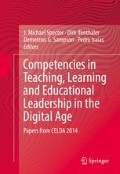Abstract
Reading in the content areas of science, social studies, and current events is a difficult task that is even more elusive to Spanish-speaking English language learners. There is a huge increase in children transitioning from their L1 (e.g., Spanish) to L2 (e.g., English) in classrooms across the USA. These ELs face challenges due to a lack of fluency in decoding, vocabulary, and word, sentence, and discourse level complexities in English learning. Structure strategy instruction on the Web for English Language Learners (SWELL) is a web-based tutoring system that supports ELs in reading comprehension by teaching them about five text structures. In addition, SWELL provides two adaptations for ELs—Spanish Scaffolding (where students were presented materials in both Spanish and English) and English Hybrid (where students were given the option of seeking assistance in Spanish by hovering over words, clicking on sentences, or viewing a full page in Spanish). In this chapter, we report on the design and pilot studies conducted within five classrooms at grades 4, 5, and 6. Our results show improvements in reading comprehension measured by researcher designed measures.
Access this chapter
Tax calculation will be finalised at checkout
Purchases are for personal use only
References
Abedi, J. (2006). Language issues in item development. In S. M. Downing & T. M. Haladyna (Eds.), Handbook of test development (pp. 377–398). Mahwah, NJ: Lawrence Erlbaum Associates.
August, D., Branum-Martin, L., Hagan, E., & Francis, D. (2009). The impact of an instructional intervention on the science and language learning of middle grade English language learners. Journal of Research on Educational Effectiveness, 2(4), 345–376. doi:10.1080/19345740903217623.
Baker, E. A., & Dalton, B. (2011). Designing technology to support comprehension among monolingual and bilingual students. Podcast: Voice of Literacy. Retrieved from http://voiceofliteracy.org.
Beck, I., McKeown, G., & Kucan, L. (2008). Creating robust vocabulary: Frequently asked questions and extended examples. New York, NY: Guilford Press.
Cummins, J. (1979). Linguistic Interdependence and the Educational Development of Bilingual Children. Review of Educational Research, 49(2), 222–251.
Dalton, B., & Grisham, D. L. (2011). eVoc strategies: 10 ways to use technology to build vocabulary. The Reading Teacher, 64(5), 306–317.
Fry, R., & Gonzalez, F. (2008). One in five and growing fast: A profile of Hispanic public school students. Washington, DC: Pew Hispanic Center Report. http://pewhispanic.org/reports/report.php?ReportID=92.
Jimenez, R. T. (1997). The strategic reading abilities and potential of five low-literacy Latina/o readers in middle school. Reading Research Quarterly, 32(3), 224–232.
Jimenez, R. T., Garcia, G. E., & Pearson, P. D. (1996). The reading strategies of Latina/o students who are successful English readers: Opportunities and obstacles. Reading Research Quarterly, 31, 90–112.
Kamil, M., & Hiebert, E. (2005). The teaching and learning of vocabulary: Perspectives and persistent issues. In E. H. Hiebert & M. Kamil (Eds.), Teaching and learning vocabulary: Bringing scientific research to practice (pp. 1–23). Mahwah, NJ: Erlbaum.
Kratochwill, T. R., Hitchcock, J., Horner, R. H., Levin, J. R., Odom, S. L., Rindskopf, D. M., & Shadish, W. R. (2010). Single-case designs technical documentation. Retrieved from What Works Clearinghouse web site http://ies.ed.gov/ncee/wwc/pdf/wwwc_scd.pdf.
National Assessment of Educational Progress (NAEP) 2013. Available at http://nationsreportcard.gov/reading_math_2013/#/ on July 3, 2014
Proctor, C. P., Carlo, M., August, D., & Snow, C. (2005). Native Spanish speaking children reading in English: Toward a model of comprehension. Journal of Educational Psychology, 97(2), 246–256.
Proctor, C. P., Dalton, B., Uccelli, P., Biancarosa, G., Mo, E., Snow, C., et al. (2011). Improving comprehension online: Effects of deep vocabulary instruction with bilingual and monolingual fifth graders. Reading and Writing, 24(5), 517–544.
Proctor, C. P., Dalton, B., & Grisham, D. L. (2007). Scaffolding English Language Learners and struggling readers in a Universal Literacy Environment with embedded strategy instruction and vocabulary support. Journal of Literacy Research, 39(1), 71–93.
Slavin, R. E., Cheung, A., Geoff, C., & Lake, C. (2008). Effective reading programs for middle and high schools. A best-evidence synthesis. Reading Research Quarterly, 43(3), 290–322.
Wijekumar, K., & Meyer, B. J. F. (2012). Comprehension using the strategic organization of text aided by a Web-based intelligent tutoring system: A text and computer based mind tool. In J. M. Spector, B. B. Lockee, S. E. Smaldino, & M. C. Herring (Eds.), Learning, problem solving, and mind tools. New York, NY: Routledge Publishers – Taylor & Francis Group.
Wijekumar, K., Meyer, B. J. F., Lei, P.-W., Lin, Y., Johnson, L. A., Shurmatz, K., et al. (2014). Improving reading comprehension for 5th grade readers in rural and suburban schools using web-based intelligent tutoring systems. Journal of Research in Educational Effectiveness, 7(4), 331–357. doi:10.1080/19345747.2013.853333.
Wijekumar, K., Meyer, B. J. F., & Lei, P. (2012). Large-scale randomized controlled trial with 4th graders using intelligent tutoring of the structure strategy to improve nonfiction reading comprehension. Journal of Educational Technology Research and Development, 60, 987–1013.
Wijekumar, K., Meyer, B. J. F., & Lei, P.-W. (2013). High-fidelity implementation of web-based intelligent tutoring system improves fourth and fifth graders content area reading comprehension. Computers & Education, 68, 366–379.
Williams, J. P., Stafford, K. B., Lauer, K. D., Hall, K. M., & Pollini, S. (2009). Embedding reading comprehension training in content-area instruction. Journal of Educational Psychology, 101, 1–20.
Acknowledgement
The research reported here was supported by the Institute of Education Sciences, U.S. Department of Education, through grant R305A130704 to Texas A&M University. The opinions expressed are those of the authors and do not represent views of the Institute or the U.S. Department of Education
Author information
Authors and Affiliations
Corresponding author
Editor information
Editors and Affiliations
Rights and permissions
Copyright information
© 2016 Springer International Publishing Switzerland
About this chapter
Cite this chapter
Wijekumar, K.(., Meyer, B.J.F., Lei, P. (2016). Improving Content Area Reading Comprehension with 4–6th Grade Spanish ELLs Using Web-Based Structure Strategy Instruction. In: Spector, J., Ifenthaler, D., Sampson, D., Isaias, P. (eds) Competencies in Teaching, Learning and Educational Leadership in the Digital Age. Springer, Cham. https://doi.org/10.1007/978-3-319-30295-9_7
Download citation
DOI: https://doi.org/10.1007/978-3-319-30295-9_7
Published:
Publisher Name: Springer, Cham
Print ISBN: 978-3-319-30293-5
Online ISBN: 978-3-319-30295-9
eBook Packages: EducationEducation (R0)

